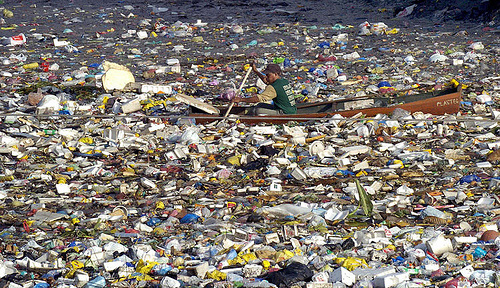Littering and dumping
 Littering and dumping include everything from tossing a candy wrapper to dropping tons of waste into the ocean. Unfortunately that waste we discard doesn’t just go “somewhere else” – but instead accumulates, with many environmental consequences. Most trash eventually washes into waterways where it threatens drinking water supplies, damages aquatic habitats, and even gets into the food chain.
Littering and dumping include everything from tossing a candy wrapper to dropping tons of waste into the ocean. Unfortunately that waste we discard doesn’t just go “somewhere else” – but instead accumulates, with many environmental consequences. Most trash eventually washes into waterways where it threatens drinking water supplies, damages aquatic habitats, and even gets into the food chain.
So why is this a commons issue? Unlike the examples of overfishing and overgrazing, no one “needs” to litter in order to survive -- or do we? Clearly it is easy to put a candy wrapper in the trash instead of tossing it on the ground. But what about the city trash collection -- building landfills or incinerators is not a cheap proposition, and they are not 100% effective either. Anything that gets out of a landfill or is given off from an incinerator is still a kind of waste. It's something we want to dispose of because it's harmful, and the environment (oceans, atmosphere, whatever) is a cheap way to do that.
Here's what Hardin had to say about it:
The rational man finds that his share of the cost of the wastes he discharges into the commons is less than the cost of purifying his wastes before releasing them. Since this is true for everyone, we are locked into a system of "fouling our own nest..."
Copyright University of Maryland, 2007
You may link to this site for educational purposes.
Please do not copy without permission
requests/questions/feedback email: mathbench@umd.edu